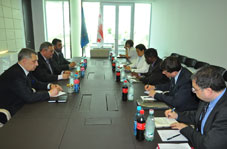
Issue of IDPs on local and international agendas
By Salome Modebadze
Friday, June 14
Georgia has over 400,000 internally displaced people (IDPS) who are unable to return to their original homes "Where they were born, where they studied, where they have graves of their family members." Georgian President Mikheil Saakashvili said at a meeting with the United Nations Special Rapporteur Chaloka Beyani on June 12th.
Stressing that the Georgian government has done a lot to provide the IDPs with housing during the past five years, Saakashvili said there is still much to be done for them. He said on the one hand they should have an opportunity to integrate with the rest of society, while, on the other hand, they should return to their homes and lands as not even “the strongest and merciless occupant and aggressor” has the right to deprive them of this right.
“This is the main point of our policy,” Saakashvili said, before expressing his hope that the international community will assist Georgia in this process.
Saakashvili said the UN resolution on refugees and internally displaced persons from Abkhazia, Georgia and the Tskhinvali region that was discussed at the 67th session of the U.N. General Assembly emphasizes the right of IDPs to return to their original homes.
The resolution stresses the importance of unhindered humanitarian activities in Abkhazia and the Tskhinvali region as well as the importance of protecting the property rights of displaced persons and refugees. A similar U.N. resolution was first adopted in 2008, right after the Georgian-Russian War in August of that year. In 2008 the resolution had only 16 supporters; by 2012 the number had increased to 60.
The resolution also requires the U.N. Secretary General to report annually to the General Assembly on the situation of refugees. The U.N. calls on participants of the Geneva Talks to intensify efforts for the return of refugees to their homes.
Beyani is visiting Georgia from June 10-14th to examine the overall situation of internally displaced persons in the country, and gather first-hand information from displaced persons and affected communities. Beyani said upon his arrival that he is interested in learning more about the process of intended changes in legislation on internally displaced persons in Georgia and to contribute to this process when necessary.
Meeting with the Parliamentary Chairman Davit Usupashvili, Beyani praised the activities of the Georgian Parliament stressing its role not only as a law maker, but as a monitor as well.
Beyani will share his preliminary observations at a press conference with the Georgian media at the Courtyard Marriott Hotel on June 14th, while his full report will be presented to the Human Rights Council in May 2014.
The Georgian Minister of Foreign Affairs Maia Panjikidze said the issue of refugees and internally displaced persons should remain the focus of attention for the international community and the resolution should also facilitate different kinds of UN activities regarding the occupied territories.
According to the head of the European Research Centre Kakha Gogolashvili, even though the resolution cannot bring practical results, it is Georgia’s attempt to remind the international community that the issue of IDPs and ethnic cleansing are still important problems for Georgia. He said the number of supporters of the resolution shows how many countries support resolving the issue.


